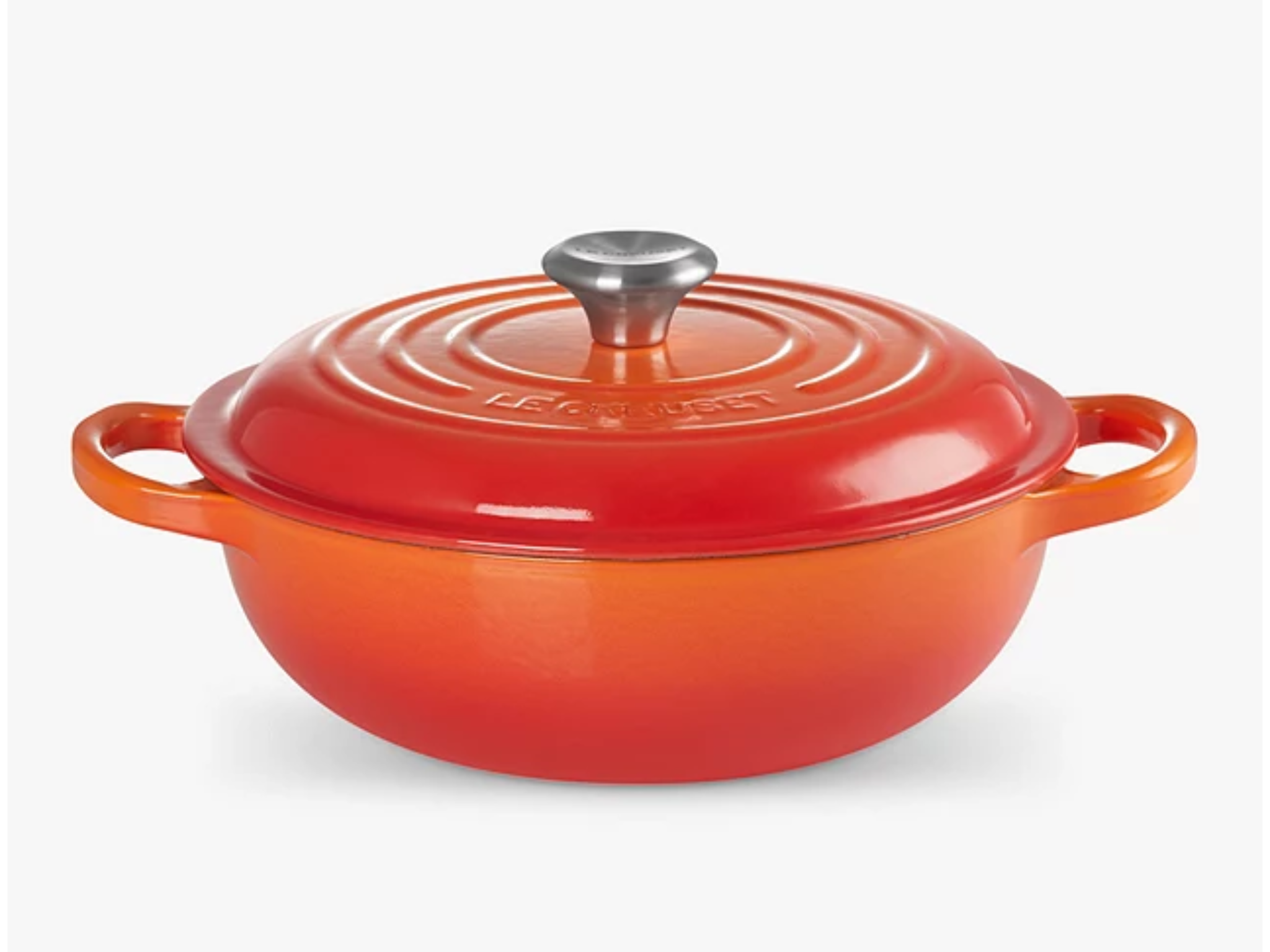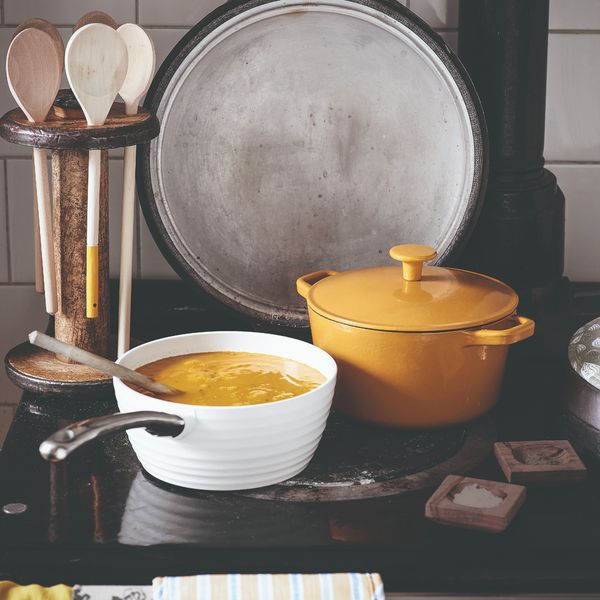God, if I could finally get a big Le Creuset, things might really turn around for me.”
What words could better sum up the stealthy yet unstoppable rise of the formerly formal French cookware brand to become peak Gen Z #kitchengoals?
The sentiment is expressed by Nicola Coughlan’s character in the 2024 Channel 4 comedy-drama series Big Mood, which follows best friends Eddie (played by Lydia West) and Maggie (Coughlan) as they attempt to navigate grown-up life in London in their twenties. They’re always teetering on the brink of going off the rails – Eddie because the rat-infested bar she inherited is failing to turn a profit, Maggie because she struggles to manage her crippling bipolar disorder – and make terrible romantic decisions, terrible professional decisions, terrible dinner party decisions (too much booze and inedible food) in their quest to play at being “proper” adults. But hey, all would be fixed if only they had a big Le Creuset! Then everything else in their chaotic lives would surely fall into place!
While we may know deep down that simply owning a robust casserole dish isn’t really a shortcut to sorting out life’s problems, this throwaway line perfectly encapsulates Le Creuset’s newfound status as the ultimate aspirational bit of homeware for Gen Z and millennials. The traditional range of cast iron cookware, known for its signature shade of “volcanic” orange, used to be something your mum might have hanging around the back of the kitchen cupboard after she picked it up at a car boot sale in the 1980s. These days, the brand is like middle-class catnip, coveted to the point where police have to get involved when they throw a sale. Yes, really.
This weekend saw hundreds of frenzied shoppers descend upon Le Creuset’s warehouse in Hampshire to snag some cut-price kitchenware. The sale was so popular that people travelled from across the country and queued for four hours to get in; police had to attend the scene to ease congestion caused by customer cars and manage the miles-long line of shoppers.
Le Creuset called the sale its “largest in-person event”, announced that discounts of up to 60 per cent would be dished out on a first-come, first-served basis, and shared that “limited-edition colours, rare shapes and other unique styles” would be available at “special prices”.
Within an hour of the sale kicking off on Saturday at 9am, miles of cars were backed up waiting to get into the car park. Shoppers were uploading videos of the queue onto social media, and later proudly showed off their “bargain” hauls on TikTok.
Perhaps this Le Creuset fever makes more sense when one considers that a standard, non-sale round casserole dish costs around £305 (the large one is £399; dream on, Maggie). Nabbing one for half price still isn’t cheap but at least puts it in a price bracket that feels slightly more attainable. But how did we even get to a point where a soon-to-be 100-year-old French cookware name has become the first word in kitchen cool – one worth spending all day on an industrial estate in Andover for?
Le Creuset first started in 1925 in France, when two Belgian industrialists met at the Brussels Fair. One specialised in enamelling, the other in casting; they put their expertise together and bam! The first coloured cookware was born, showcased in the pair’s original cast iron cocotte in what would become Le Creuset’s signature orange, inspired by the “fiery orange colour of molten cast iron inside the foundry moulds”.
The name is synonymous with tradition and endurance – still made in the original foundry in the village of Fresnoy-le-Grand, with each piece issued a “lifetime guarantee” – and there have only been a few tweaks to the original design over the past 10 decades.

Thanks to feted designers, celebrity fans and chef endorsements, the brand has long carried a certain cachet. In 1958, Raymond Loewy, the French-born American credited as being the father of industrial design, restyled the traditional casserole dish to appeal to more minimalist, post-war tastes; in the 1960s, the launch of the range in a sunny shade of yellow attracted a starry fan in the form of Marilyn Monroe. The Nineties brought a new blue hue in honour of Elizabeth David, the British chef who popularised Mediterranean cooking in the UK.
Popular culture further cemented the Le Creuset appeal – notable appearances included the sitcom Friends, in which the character of Monica frequently whipped out an orange Dutch oven when cooking during episodes. As part of a surprising official “collab” in 2019, it also released a Star Wars range that included a Han Solo roasting pan, Darth Vader Dutch ovens and Millennium Falcon waffle irons.
Now, in 2024, Le Creuset’s remarkable resurgence is arguably down to social media and what I’m going to dub “Generation Aspiration”. The brand has a jaw-dropping 1.2 million Instagram followers, who drool over its rainbow-coloured products. Over on TikTok, it’s well and truly tapped into the “cottagecore” trend – fans use the hashtag #LeCreuSlay to show off their creations or simply “unbox” their enviable new kit.
Le Creuset embodies the adulthood aesthetic – the supreme sign that you’ve transitioned into being an honest-to-goodness grown-up
Players such as TK Maxx have exploited the craze, offering Le Creuset mugs for £9 and small oven dishes for £16.99 so that those without the requisite hundreds of pounds can still buy their own little slice of the “lifestyle”. Elsewhere, numerous copycat brands have sprung up, while fans of the OG delight in hunting down true Le Creuset bargains on second-hand sites like eBay.
Lest we forget, this is well-made, nice-looking, durable cookware with a healthy dose of nostalgia thrown in for good measure – reason enough, you might argue, that it’s remained in vogue for so long. But the real attraction for young people? Just as Big Mood identified, Le Creuset embodies the adulthood aesthetic – the supreme sign that you’ve transitioned into being an honest-to-goodness grown-up. It may just be a casserole dish but, for those of a certain age, it feels inherently imbued with the power to transform the owner into a completely different kind of person. The kind of person who can throw together a perfect beef bourguignon, roast potatoes with confit garlic, or honey-glazed apple galette on a whim; the kind of person who invites friends over for a glass of wine and sophisticated conversation in their immaculately clean kitchen. The kind of person, in other words, who actually has their s*** together.
At the end of the day, there’s nothing wrong with lusting after an expensive piece of kitchenware. But just remember, you’ll still be, well, you after you’ve shelled out £110 for an orange baking tray – even if you did get 60 per cent off.










